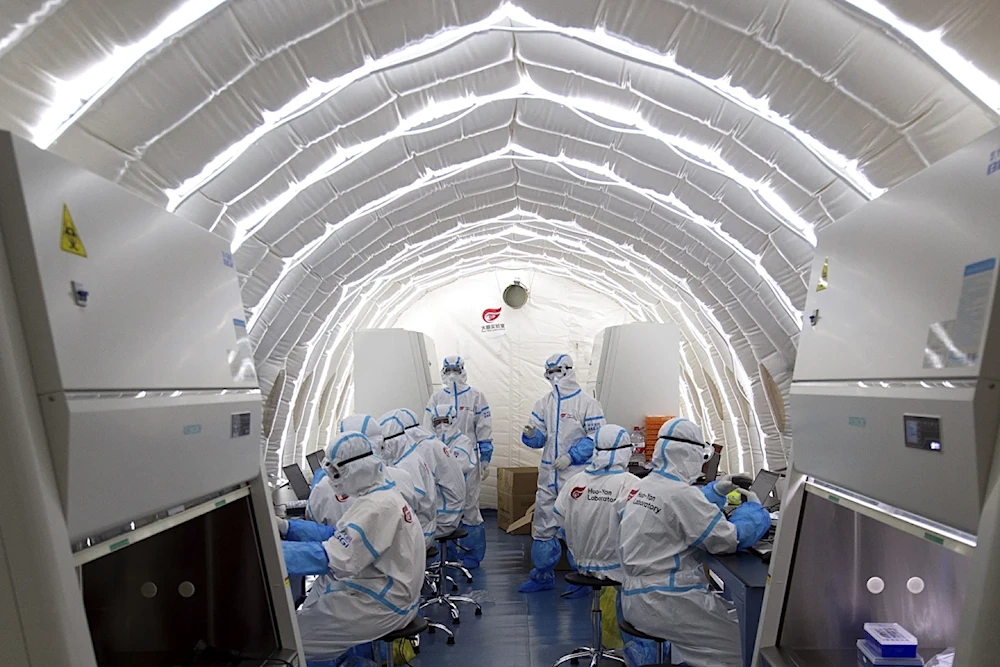China outpaces US in military use of cutting-edge biotechnology
A new report warns that China's rapid advancements in biotechnology pose a significant risk to the US security, with potential game-changing impacts on warfare, economies, and global power.
-
 Staff work in an inflatable lab provided by biotech company BGI Genomics, Beijing, June 23, 2020 (AP)
Staff work in an inflatable lab provided by biotech company BGI Genomics, Beijing, June 23, 2020 (AP)
A key front in the strategic rivalry between the US and China, biotechnology, has largely gone unnoticed by the public, despite its potentially massive impact on national defense, economies, and global influence.
From advanced body armor and adaptive camouflage to lab-grown food for soldiers and genetically enhanced troops, biotech holds the potential to reshape the future of warfare.
A newly released report reveals that China is gaining ground fast in this space, putting the US at a strategic disadvantage. The report, submitted to Congress by the National Security Commission on Emerging Biotechnology, is the product of two years of analysis and input from a range of experts, including Sen. Todd Young, former Google CEO Eric Schmidt, and biotech and defense leaders.
In a recent social media post on X, Sen. Todd Young emphasized this point, writing, "The United States must get serious about biotech and not let China dominate this industry."
The United States must get serious about biotech and not let China dominate this industry. https://t.co/VopDMs6ZHD
— Senator Todd Young (@SenToddYoung) April 16, 2025
China began prioritizing biotechnology two decades ago and is now rapidly pulling ahead. To remain competitive, the US must respond with major investments, specifically, at least $15 billion over five years, according to the report.
Efforts have already been made by the US to weaken China’s growing dominance in the biotech space. Last September, the House passed the BIOSECURE Act, a bill aimed at blocking federal funding from reaching Chinese-linked biotech firms such as Complete Genomics, according to the Associated Press (AP).
To further combat China's growing dominance, the report highlighted opportunities for collaboration, particularly through NATO’s Defense Innovation Accelerator for the North Atlantic (DIANA), a program aligned with NATO's Innovation Fund.
The NATO Innovation Fund was approved in 2021 in order to foster technological superiority among alliance members. According to NATO's Secretary-General, the objective of the fund will be to support innovations that will strengthen the alliance's collective security.
Weaponizing biotechnology
However, the report advises the US against trying to mirror China's approach, as it relies on a deep integration of civilian and military biotech efforts.
It also claims that there is "every reason to believe" the Chinese Communist Party will "weaponize biotechnology", adding that the drone warfare "will seem quaint" the day the People's Liberation Army debuts genetically enhanced troops.
Sen. Young emphasizes the transformative potential of biotech on the battlefield, highlighting scenarios like manufacturing stable blood supplies in combat zones or using biologically engineered materials to boost missile range.
In 2022, Deputy Secretary of the Security Council of the Russian Federation Alexander Venediktov revealed that the US may potentially have a network of closed biolaboratories around the world of more than 400 facilities. At the time, he stated "There are a number of suspicious coincidences that are revealed when two maps are superimposed – the locations of American closed biological laboratories and the zones of the emergence of new epidemic threats that we identify."
Barriers exist, however, as the US lacks sufficient manufacturing capacity, and investors are hesitant to fund biotech ventures due to high costs and long timelines. These barriers risk stalling progress at a time when global competitors, particularly China, are rapidly advancing.

 3 Min Read
3 Min Read








